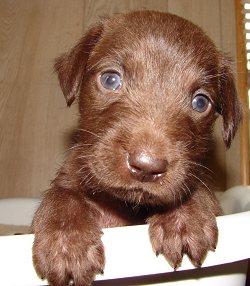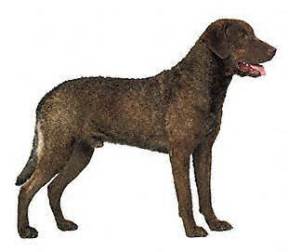Height: 21-26 inches
Weight: 55-80 lbs.
Life Span: 10-12 yrs.
Breed Group: Sporting Dogs
Overview
Chesapeakes are good family dogs but can be reserved with strangers and
aggressive toward other dogs. They are friendly to children if raised with
them.
Obedience training and socialization with other people and animals must
begin early, and aggressive games should be avoided.
Appearance
The outercoat is thick, short, harsh, oily, and wavy in places; the undercoat
is dense, fine, and woolly--a unique coat that resists water and helps to
keep the animal warm.
Color ranges from tan to a dull straw color (called "deadgrass" in this
breed) to dark brown. The eyes are yellow or amber.
Grooming & Exercise Needs
Chesapeakes need to be brushed only occasionally. They require a few vigorous
walks or runs daily, along with frequent retrieval and swim outings.
Origins
The Chesapeake Bay retriever, considered the finest waterfowl dog, originated
in early 19th-century Maryland, where it was famous for enduring mile-long
swims and retrieving hundreds of ducks per day from the rough, icy waters
of Chesapeake Bay.
The breed probably resulted from the crossing of Newfoundland-type dogs
with the curly-coated retriever, the Irish water spaniel, and possibly the
otter hound.
Special Alerts
Apartment or urban living is not recommended for Chesapeakes, and they are
not suitable for inexperienced owners.
Breed-related health concerns: hip dysplasia, progressive retinal
atrophy.
Reference: AKC - American Kennel Club |

